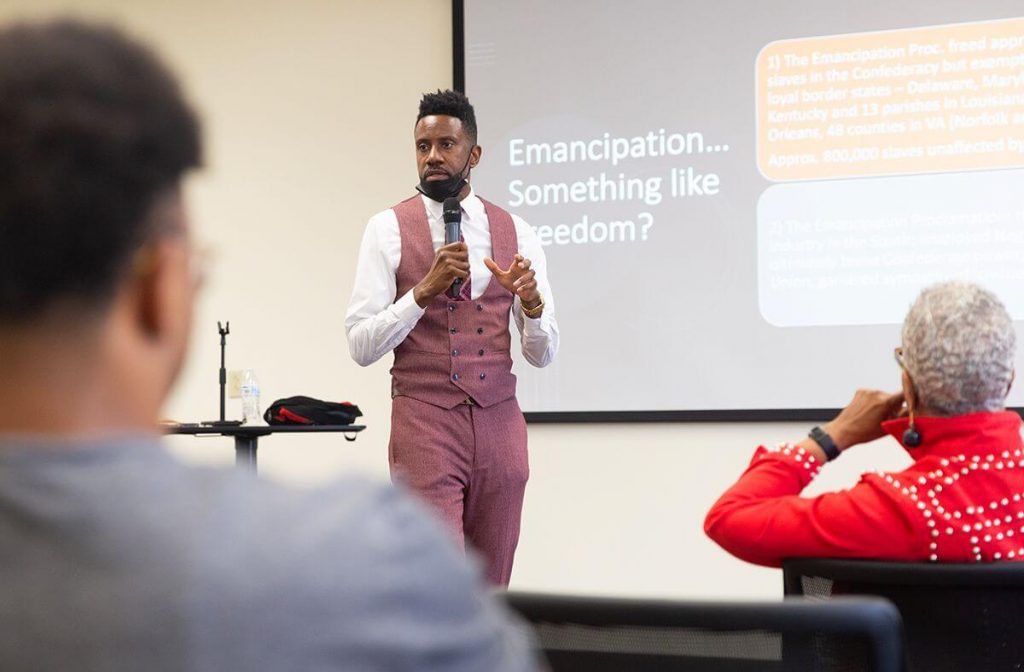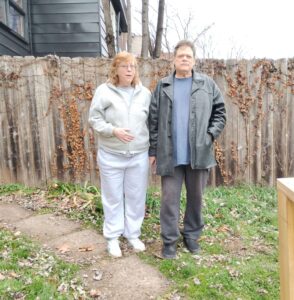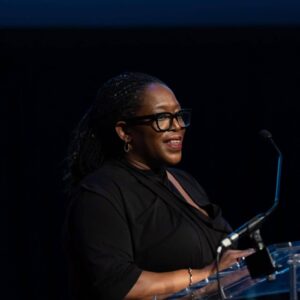Tell us about your journey and how you ended up specializing in Black studies, history, and leadership development.
I started at Clark Atlanta University in 1992 as a political science and pre-law major. In my senior year, one of my professors, Dr. Michael S. Bailey, who had both a law degree and a PhD, said that we need more minorities who can create knowledge. He told me, “Law school indoctrinates you, but grad school allows you to create knowledge.” That stuck with me. It was too late to change my major, but that summer I came home feeling uncertain. I had spent all this time working toward law school, and now I wasn’t sure it was the right path. I was working odd jobs, and one day during my lunch break, as I was reading about the Harlem Renaissance, it hit me: I would really love to teach people this history. That’s when I started applying to grad schools for history.
The University of Pittsburgh accepted me, which is where I earned my master’s in Black studies and began working toward a PhD. I was down to what they call ABD — “all but dissertation” — when I got a job at Penn State as a history instructor. I took 10 years off from grad school and poured myself into being a great professor. I became a decorated educator, a minister, and joined the Langston Hughes Poetry Society, a Pittsburgh art collective that engaged in civic and intellectual work. I was living my calling but hadn’t finished the degree.
In 2017, I came back to it, and in 2020, I finally earned my PhD. I felt like God had blessed me twice! I share my story with students, because I want them to know that it’s okay if there are zigzags in their journey. They may see me on stage and think it came easy, but in my darkest hour, I had a village praying for me and pushing me forward. My story as a Black scholar is one of redemption, giving back, and being able to do what I’m passionate about.
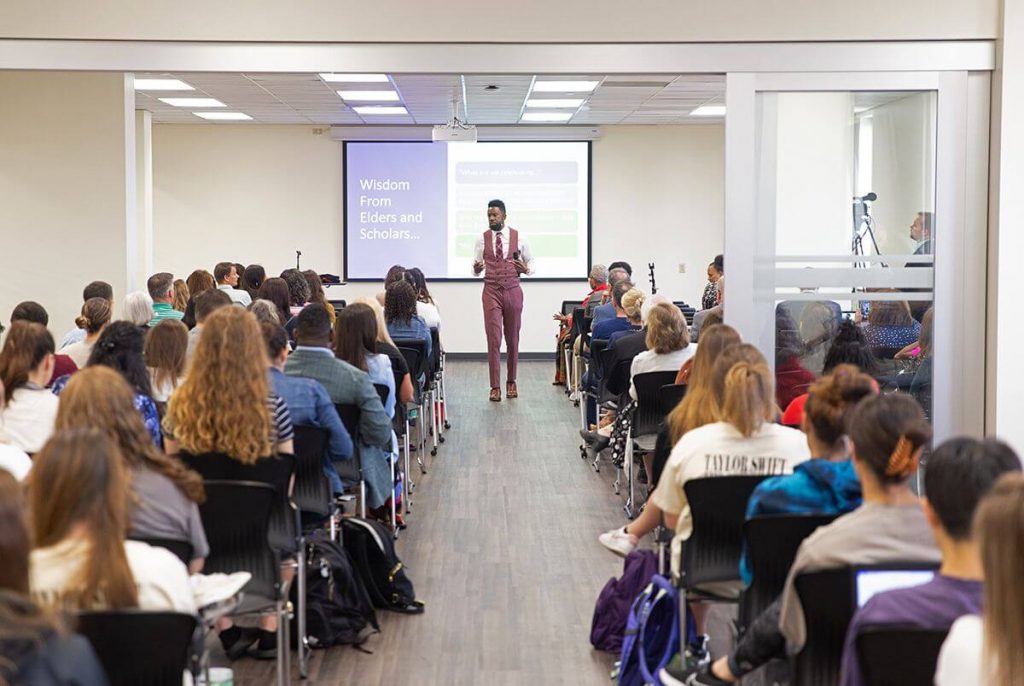
How did you get connected to Catapult?
In 2017, we started an initiative on our campus called “Crossing Bridges.” We connected our campus more deeply to the surrounding community of McKeesport. In the virtual series, one of our guests was Catapult CEO Tammy Thompson. On Zoom, her energy was palpable. We kept in touch and last summer she mentioned that they had a space open on the board and asked me to join.
With your expertise and background, you provide an invaluable historical and cultural lens to Catapult's programming. Can you share any examples of how you've helped shape the direction of Catapult since joining the board?
I believe education can be a part of the Catapult mission, in a systematic way. One of the things about Black studies — going back to the late 1960s — was the idea that college was not providing the Black community with what they wanted, so the Black community filled in the gaps. For example, The Black Panthers held Saturday classes that taught people about civics and their rights. Catapult can build a comprehensive education curriculum for people who want to take more ownership of their finances and ability to thrive economically. I can help Catapult think about a holistic integration of education in their next phase of development.
You did your dissertation on Black jazz musicians in Pittsburgh before and after integration, looking at how collective memory re-imagines the past. What’s one way you think we are collectively re-imagining the past today?
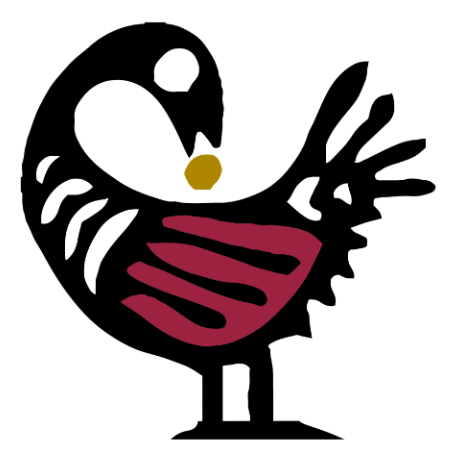
One of the things I teach in Black studies is the Ghanian concept of Sankofa. Sankofa is symbolized by a bird looking backwards. If you imagine a duck with its neck turned all the way around — the idea of Sankofa is reaching back to the past to pull valuable things to the present.
Catapult is a great example of that. Black people have a long legacy of Black wealth building. Communities built Black towns that had essentially everything one could need.
Today, Catapult is taking us back to this legacy of underserved communities sustaining themselves. We can still work within the greater mainstream of society. But Catapult is in line with a long tradition of self-autonomy in the Black community. If you look at the executive board, Catapult is elevating a lot of Black women into leadership positions. This is also a re-imagining of the civil rights movement, where women didn’t get sufficient credit as the backbone of the civil rights movement. By empowering women in leadership, Catapult is harkening back to African traditions and taking them a step further into the modern day.
You're also an artist, poet, and musician. How does that inform the work that you do?
For me, the work of liberation is about empowering people through education. Some things I can teach with textbooks, but other things require a different language. When you’re trying to push America to be better “you can’t leave any weapons on the shelf,” to quote my friend, Congresswoman Summer Lee. Art and creative expression are powerful weapons. They speak to the emotional core of what’s human and what’s urgent.
The history I teach — is heavy. I’ve had students cry in class when we talk about things like police brutality, not just because they’re learning about it, but because they’ve lived it. Sometimes, a poem or a song can open a door that a lecture can’t.
What do you think makes Catapult unique as an organization, and what excites you about its future?
One of the things that excites me most about Catapult is its leadership. I trust them. They’re genuinely invested in people’s wellbeing, and there’s a culture of excellence across the board — whether it’s financial education, communications, or the folks serving on the board. When I joined the board, Catapult was beginning to take a quantum leap in terms of funding and outreach. I’ve witnessed Catapult’s financial partnerships directly improve people’s lives. People are becoming homeowners. Young business owners — future CEOs — are being nurtured here.
Coming from academia into the nonprofit world, it’s been incredible to watch an organization on the cutting edge of community transformation. It is democracy at a ground level. Catapult helps facilitate the American Dream — in the original sense: The idea that everyone should have the opportunity to maximize their innate gifts and talents and make something of them. That’s what this organization makes possible.
Is there anything else you’d like to share?
As an academic, I live in the realm of ideas and theory. I’ve done a lot of community work, but working with Catapult has reminded me of how powerful it is to collaborate. My academic expertise can be used in a whole new way. I feel encouraged that there’s still space in America for real coalitions — for people to bring their skills together with a shared goal of making lives better. Humbly, it’s helped me bring the theory of liberation into reality.

